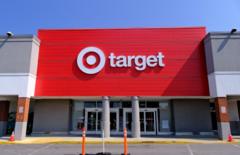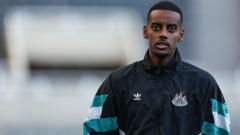Can Target's New CEO Turn Around Sales?

Target, a leading US retail giant, has appointed Michael Fiddelke as its new chief executive, aiming to address ongoing sales declines and a falling share price. This leadership change comes amidst rising costs and uncertainties related to US tariffs, which have affected consumer spending, particularly on discretionary items like apparel and electronics.
Last updated: 17 October 2023 (BST)
Key Takeaways
- Michael Fiddelke will replace Brian Cornell as CEO in February 2024.
- Target has faced significant challenges, including a 5.7% drop in sales in recent months.
- The company is under pressure from competitors like Amazon and Walmart.
- Fiddelke aims to enhance product quality and technology integration.
- Investors may be disappointed by the appointment of an insider over an external candidate.
Background of the Leadership Change
Target's decision to appoint Michael Fiddelke as CEO reflects its attempt to return to a tradition of promoting leaders from within the company. Fiddelke, who has dedicated 20 years to Target, will replace Brian Cornell, who has served as CEO for a decade. Under Cornell's leadership, Target faced various challenges, including rising competition and changing consumer preferences.
Challenges Facing Target
The retail environment has been particularly challenging for Target lately. The company reported a significant 5.7% decline in sales for the three months leading up to May, attributing this downturn to a "highly challenging environment." This drop was compounded by external pressures such as inflation and the introduction of trade tariffs, which have increased costs and affected pricing strategies.
The Impact of Tariffs and Inflation
The ongoing debate surrounding US tariffs has raised concerns about their effect on consumer spending. As prices rise, consumers often cut back on discretionary spending—items that are not essential, such as clothing and electronics. This shift has particularly impacted Target, which relies heavily on these categories for revenue.
Market Reactions and Investor Sentiment
Following the announcement of Fiddelke's appointment, Target's shares experienced a nearly 11% drop, highlighting investor concerns over the company's ability to navigate its current challenges. While shares have shown slight recovery, the overall sentiment suggests a level of uncertainty regarding the effectiveness of an internal appointment during a time when fresh perspectives may be crucial.
Expert Opinions on the Leadership Transition
Market analysts have expressed mixed feelings about Fiddelke’s promotion. Susannah Streeter, head of money and markets at Hargreaves Lansdown, indicated that investors might have preferred a candidate from outside the company to bring new insights and energy. Similarly, Michael Baker from DA Davidson remarked that the announcement lacked the excitement that might come from hiring an external leader.
Fiddelke's Vision for Target
In his initial statements, Fiddelke acknowledged the challenges ahead, stating that the company has "work to do" and needs to move "faster, much faster." He highlighted his commitment to improving product quality and integrating more technology into Target's operations. This focus on enhancement is seen as critical to reviving customer interest and driving sales.
Rebuilding Product Quality and Technology Integration
Fiddelke's strategy involves a two-pronged approach: improving product quality and leveraging technology. By ensuring that products meet consumer expectations, Target hopes to regain market share lost to competitors. Moreover, embedding technology into the shopping experience could enhance customer engagement and streamline operations.
Comparative Landscape: Competing with Amazon and Walmart
Target operates in an intensely competitive landscape dominated by giants like Amazon and Walmart. These companies have adopted aggressive strategies to capture market share, including price cuts, broad product selections, and strong online presences. To compete effectively, Target must differentiate itself by offering unique value propositions and a seamless shopping experience.
Target's Unique Selling Proposition
Despite the challenges, Target is known for its affordability, offering a range of products from clothing to groceries. This breadth of offerings is a significant advantage; however, the company must ensure that it maintains quality and accessibility. Balancing these aspects is essential for retaining customer loyalty and driving sales growth.
Recent Sales Performance and Future Expectations
The recent sales slump has prompted Target to revise its expectations for the year. The decline in consumer spending, particularly in discretionary products, has forced the company to rethink its strategies. As Fiddelke takes over, investors will be keen to see how he addresses these challenges and implements effective solutions.
Potential Strategies for Recovery
- Enhancing In-Store Experience: Revamping store layouts and improving customer service to create a more inviting atmosphere.
- Strengthening Online Presence: Expanding e-commerce capabilities to cater to the growing number of online shoppers.
- Diverse Product Range: Introducing exclusive collaborations and unique products to attract different customer segments.
- Promotions and Discounts: Implementing targeted marketing strategies to incentivise purchases and clear excess inventory.
Conclusion: What Lies Ahead for Target?
As Michael Fiddelke prepares to take the helm at Target, the challenges he faces are significant. The retail environment is evolving rapidly, and consumer demands are shifting. Fiddelke’s ability to adapt to these changes will be crucial in steering Target back to profitability and growth. The coming months will be telling as investors and customers alike await the results of his leadership strategies.
How Target navigates this transition will be a critical factor in determining its future success in a competitive retail landscape. With effective leadership and strategic innovation, Target has the potential to reclaim its position as a favourite among consumers. #Target #RetailLeadership #ConsumerTrends
FAQs
Who is Michael Fiddelke?
Michael Fiddelke is the newly appointed CEO of Target, set to take over from Brian Cornell in February 2024. He has been with the company for 20 years and served as the chief operating officer prior to his promotion.
Why did Target's sales decline?
Target’s sales declined due to a combination of rising prices, competition from Amazon and Walmart, and consumer spending cuts on discretionary items. The introduction of US tariffs also contributed to the challenging retail environment.
What changes can we expect under Fiddelke's leadership?
Under Michael Fiddelke's leadership, we can expect a focus on improving product quality, integrating more technology into operations, and potentially revamping customer engagement strategies to boost sales and market competitiveness.
How did investors react to Fiddelke's appointment?
Investors responded cautiously to the announcement of Michael Fiddelke as CEO, resulting in a nearly 11% drop in Target's shares, reflecting concerns over the choice of an insider rather than an external hire.
What is Target's strategy to compete with Amazon and Walmart?
Target's strategy includes enhancing the in-store experience, expanding its online presence, introducing exclusive products, and implementing targeted promotions to attract customers and compete effectively in the retail market.
Published: 2025-08-20 17:20:36 | Category: technology



